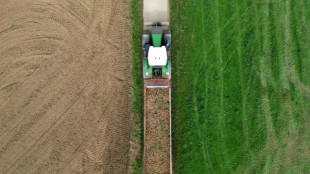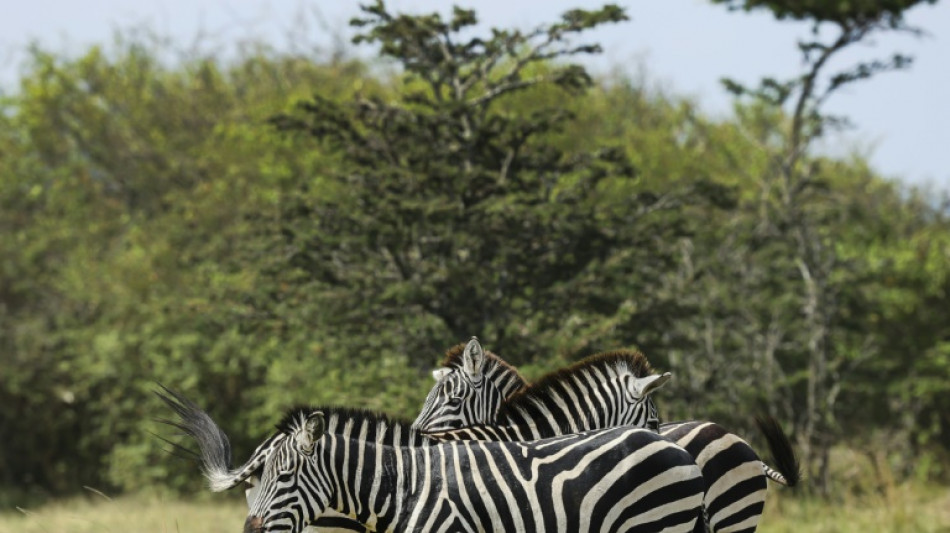
-
 UBS beats expectations as claws backs provisions
UBS beats expectations as claws backs provisions
-
German neo-Nazi rappers push hate speech, disinfo on TikTok

-
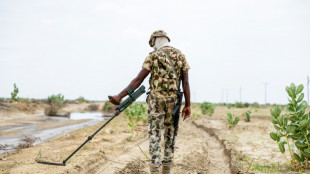 US aid flows to Nigeria anti-landmine efforts - for now
US aid flows to Nigeria anti-landmine efforts - for now
-
Low turnout as Tanzania votes without an opposition
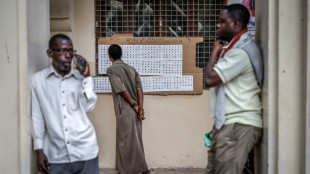
-
 Monarch-loving Trump gifted golden crown once worn by South Korean kings
Monarch-loving Trump gifted golden crown once worn by South Korean kings
-
Dutch vote in test for Europe's far right

-
 Fugitive ex-PM says Bangladesh vote risks deepening divide
Fugitive ex-PM says Bangladesh vote risks deepening divide
-
On board the Cold War-style sealed train from Moscow to Kaliningrad

-
 Spain to hold memorial on first anniversary of deadly floods
Spain to hold memorial on first anniversary of deadly floods
-
Gaza's civil defence says at least 50 killed in Israeli strikes
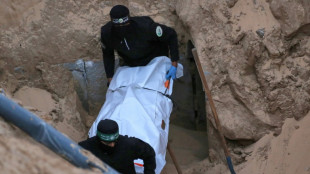
-
 Trump said 'not allowed' to run for third term, 'too bad'
Trump said 'not allowed' to run for third term, 'too bad'
-
Unruffled by Trump, Chinese parents chase 'American dream' for kids
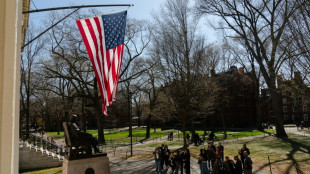
-
 Australian police design AI tool to decipher predators' Gen Z slang
Australian police design AI tool to decipher predators' Gen Z slang
-
Tanzania polls open with opposition excluded
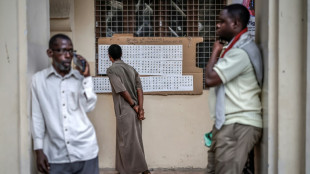
-
 Reckless England set New Zealand 176 to win second ODI
Reckless England set New Zealand 176 to win second ODI
-
Tanzania votes but with opposition excluded

-
 Coach defends handing Australia captaincy back to Sam Kerr
Coach defends handing Australia captaincy back to Sam Kerr
-
Thunder, 76ers remain unbeaten with NBA comeback wins

-
 France expected to adopt consent-based rape law
France expected to adopt consent-based rape law
-
Blue Jays swat Dodgers 6-2, level World Series

-
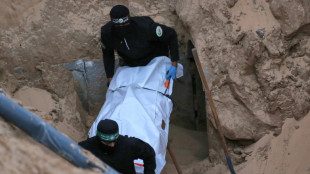 Trump says 'nothing' will jeopardise Gaza ceasefire after Israeli strikes
Trump says 'nothing' will jeopardise Gaza ceasefire after Israeli strikes
-
Australia's Cummins makes tentative bowling return

-
 Veni, vidi, whoopsie: Australian schools make Caesar exam blunder
Veni, vidi, whoopsie: Australian schools make Caesar exam blunder
-
With 100 days to go, Milan Winter Olympics chiefs 'can see finish line'

-
 Pakistan says peace talks with Afghanistan 'failed'
Pakistan says peace talks with Afghanistan 'failed'
-
NZ raids shipping insurer over alleged sanctions busting

-
 Resilient young woman leads fight for euthanasia in Mexico
Resilient young woman leads fight for euthanasia in Mexico
-
'Dangerous Liaisons' gets MeToo twist in prequel 'The Seduction'

-
 As US blows up drug boats, Venezuelan oil sets sail
As US blows up drug boats, Venezuelan oil sets sail
-
US Fed on track to cut rates again in penultimate decision of 2025

-
 North Korea announces missile test hours before Trump due in South
North Korea announces missile test hours before Trump due in South
-
'Arrested for singing': Russia's case against teen busker stirs anger

-
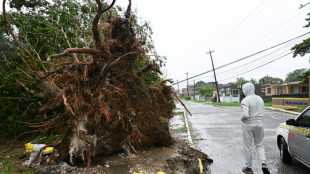 Hurricane Melissa takes aim at Cuba after roaring across Jamaica
Hurricane Melissa takes aim at Cuba after roaring across Jamaica
-
Ecological Threat Report 2025: Extreme Wet-Dry Seasons Emerge as Critical Conflict Catalyst

-
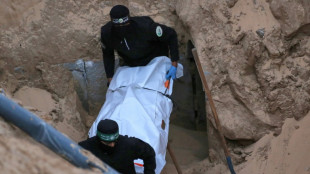 Israel launches air strikes on Gaza, says Hamas attacked troops
Israel launches air strikes on Gaza, says Hamas attacked troops
-
Injured Springer out of World Series game four

-
 'No-feeling' Alcaraz eliminated from Paris Masters
'No-feeling' Alcaraz eliminated from Paris Masters
-
Favorite Sovereignty could miss Breeders' Cup Classic after fever

-
 Putellas-inspired Spain to defend Nations League title against Germany
Putellas-inspired Spain to defend Nations League title against Germany
-
Microsoft holds 27% of OpenAI in revamped partnership

-
 Bronze nets birthday goal as England's women beat Australia
Bronze nets birthday goal as England's women beat Australia
-
'Catastrophic' hurricane slams Jamaica with fierce winds and rain
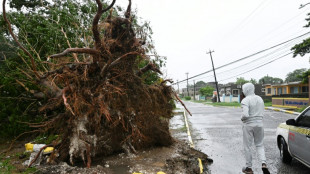
-
 Cameroon blames post-vote deaths on opposition leader
Cameroon blames post-vote deaths on opposition leader
-
Cubans flee the coast as Hurricane Melissa looms
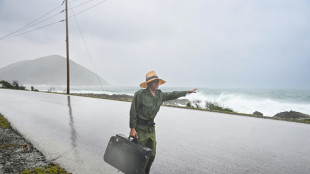
-
 Trump heads to South Korea with all eyes on Xi meeting
Trump heads to South Korea with all eyes on Xi meeting
-
At least 64 killed in war-like Rio drug raids

-
 Alcaraz stunned in Paris Masters opener by Britain's Norrie
Alcaraz stunned in Paris Masters opener by Britain's Norrie
-
Dortmund knock Frankfurt out of German Cup on penalties

-
 Napoli three points clear at Serie A summit after win at Lecce
Napoli three points clear at Serie A summit after win at Lecce
-
Putellas scores again to lead Spain into UEFA women's Nations League final


Kenya conservation areas evolve to keep Maasai and wildlife together
At dawn in a village in Kenya's Maasai Mara wilderness, zebras rouse themselves and head away from the huts where they like to sleep as protection from lions.
Bernard Kirokor, 21, recounts watching an elephant give birth across from his village a few days earlier, showing a video of the mother protecting the newborn, its trunk poking up like a periscope to sniff for danger.
"The wildlife are our neighbours and we love them," he said, as the villagers milked the herd of cattle gathered around their huts.
The village lies in the Nashulai conservancy, which prides itself on how the local Maasai community and their cattle continuing to live alongside the lions, elephants and giraffes for which the region is world-famous.
Community conservancies emerged in the 2000s to protect wildlife corridors, with locals pooling their individual plots and pulling down fences so animals could roam freely.
To make it pay, locals often leased their land to tourist companies and moved away.
Nashulai, which means "co-existence" in the local Maa language, was founded in 2016 with a determination to keep its 6,000 people in the conservancy.
It prides itself on being the first that was formed, owned and managed by local Maasai without help from an outside tourism company.
"We don't want to create conservation refugees. The Maasai have lived with the wildlife for the longest time possible. Why do we have to move them because of conservation?" Evelyn Aiko, Nashulai's conservation manager, told AFP.
Nashulai earns money through a college in the conservancy, training locals to become rangers and tour guides, and study programmes with universities.
Its model has earned international recognition, including the United Nations Development Programme's Equator Prize in 2020 and a Collective Action Award from the Rights and Resources Initiative this year.
- Connectedness -
The system of conservancies has changed radically over the past decade, with almost all now embracing the idea that people should stay living in them, albeit with limits on development.
"A lot has changed in how they are governed," said Eric Ole Reson, chief programmes officer at the Maasai Mara Wildlife Conservancies Association.
"As we extended into more areas, with more settlements, we could not keep moving people," he said.
This was important in Nashulai from the start.
"There was a present and clear danger of losing the cultural connectedness to the land... which contains all our stories for living, this land where the bones of our ancestors are buried," said founder Nelson Ole Reiyia.
Nashulai is run by a council of elders who decide on grazing and conservation areas.
"It revives their old tradition of stewardship and their connectedness to the land and the wildlife," said Ole Reiyia. "It has really given them a lot of pride."
Lacking commercial tourism investors, Nashulai relies on donors for more than half its funding and faces many pressures.
One is climate change, as unpredictable rains make it hard to plan cattle-grazing and keep the area habitable for wildlife. The team is responding with regenerative programmes like tree-planting.
The other threat is wealthy tourism operators next door. Last year, a fifth of Nashulai's landowners were enticed into leasing their plots to tourist camps and moving away.
- 'Not one-way' -
But Maasai landowners across the region now play a very active role in managing conservancies across the region, sitting on joint boards with the tourism companies.
"It's not a one-way system where someone dictates the payments," said an expert who has helped negotiate the deals, but requested anonymity due to the sensitivity of the subject.
"These negotiations go on for years and then they get renegotiated," he said. "If people aren't happy they'll tell you about it."
Many Maasai landowners have signed new leases in the last couple of years as the original deals expired, he said, so "clearly many people feel they have benefitted".
S.AbuJamous--SF-PST

